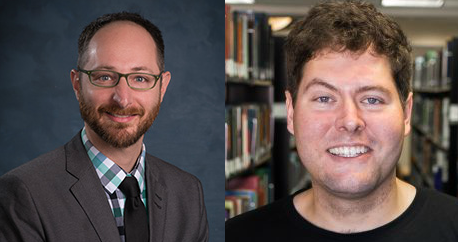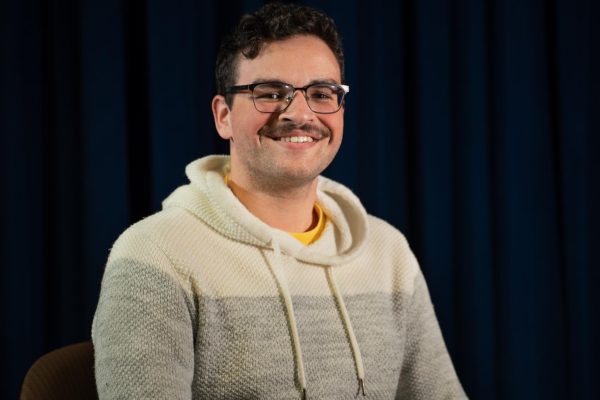Courage and ambiguity are some of Dr. Sanford Tweedie’s favorite words.
Having been a writer, a professor, a dean, a husband, and a father, Tweedie is no stranger to having courage and facing ambiguous situations.
Tweedie will step down as dean of the Ric Edelman College of Communications and Creative Arts on August 1. He has held the position for nine years.
He is a soft-spoken and gentle man with a lot to show for his life so far.
Physically in his office, with books filled to the brim with post-it notes from his teaching days, art along every wall from the people in his life, and various memorabilia. And also with his stories, having won a Lindback Distinguished Teaching Award, wrote a book, and traveled well.
Tweedie is filled with experience and advice, not least of which from his passions for writing.
Early life and education – 1962-1990
Tweedie grew up in Port Huron, Michigan, a port city on Lake Huron. He showed where it was by holding up his hand and pointing to his thumb, representing east Michigan.
According to Tweedie, the city had “lots of freighters, lots of hockey, lots of sailing, none of which I did.”
For his bachelor’s, he studied English literature at the University of Michigan. Writing has always been a passion of his.
“There may be better ways to say things, there may be less effective ways to say things, but there’s no right or wrong,” Tweedie said. “There’s ambiguity in language.”
He kept it up for his master’s at the University of California in San Diego. He was studying English, and specifically 20th-century poetry, but then dropped out.
“Best decision I ever made,” Tweedie said. “Everyone should drop out of school at some point. Gives you control, right?”
Upon returning to Michigan, Tweedie decided he wanted to teach K-12. He returned to study for his master’s, this time in both English literature and language at Eastern Michigan University.
Student teaching eighth grade, however, was a difficult task. Instead, he found an opportunity to adjunct at the university level, which appealed to him much more.
In order to become a full professor and get the benefits, he went to the University of Wisconsin, Milwaukee, to get his Ph.D. in English language and literature. It was during this time that he had his first experience living abroad.
Giessen, Germany – 1990-1992
While studying for his Ph.D. in Milwaukee, Tweedie got the opportunity to teach at the University of Giessen in Germany for two years. Giessen is a town north of Frankfurt, a major city in Germany.
The opportunity came as part of an exchange program between the two universities.
It was a leap of faith for Tweedie, as it wasn’t a popular program for his peers. He even went against his mother’s judgement to “give it a shot.”
He’d been to Germany before to visit an old college roommate in Munich. Growing up, he’d heard a lot of negative comments about Germany.
His parents were children during World War II, so Germany wasn’t a popular place. However, when Tweedie made it to Munich, he found his post-war notions of the country were wrong.
In Giessen, he taught courses in writing, American culture, and one in grammar he didn’t enjoy. He was able to explore the country in those two years as well.
At an Oktoberfest celebration in Munich, Tweedie started talking with a man who misheard that he lived in “Giesing,” which is a town near Munich.
When Tweedie corrected him, saying it was “Giessen,” the man was less impressed. Giesing is considered a beautiful town in Munich, whereas Giessen is considered less so.
“There’s an architecture school in Frankfurt,” Tweedie said. “They would take the students to Giessen to show them how not to rebuild a city after the war.”
For Tweedie, his experience solidifies him as a big proponent of studying abroad as a piece of advice for students.
“Go now while you can. Once you’re out, it’s harder,” Tweedie said.
He said it’s a good way to understand the world and oneself more, since one questions a lot about both one’s home country and the country one stays in.
“So you have this sort of reciprocal questioning of everything,” Tweedie said. “You start to say, ‘Oh, wait a minute. People are doing it differently.’”
Going to Rowan – 1994
While Tweedie was still working on his Ph.D. dissertation, he applied for over 100 university teaching jobs around the country.
Already married to his wife, Roberta Harvey (now Rowan’s vice president for academic affairs), they put up a map with pins for every job Tweedie applied to.
Eventually, only four pins remained. One of them was the newly renamed Rowan University.
Harvey didn’t want to move to New Jersey, and Tweedie wasn’t keen on it either. He had driven through the state on the way to New York City once and wasn’t impressed.
However, he took the interview anyway. Driving through South Jersey, he took a different perspective altogether.
“You just drive around [South Jersey] and it’s like, ‘it is rural,’” Tweedie said. “I remember, like, just when I got here for my interview and driving down 55, I’m like, ‘This doesn’t look like North Jersey.’ I was just surprised, you know.”
In 1994, Tweedie became an instructor at Rowan, teaching in the Communications Department in Liberal Arts and Sciences, now the Edelman College of Communications and Creative Arts.
He then became a full-time faculty member after finishing his dissertation, moving up the ladder from instructor to assistant professor, to associate professor, and then full professor.
After his first years of teaching at Rowan, Tweedie secured a Fulbright scholarship and sabbatical in 2000, where he would return to teaching in Germany for a year, and sow the seeds for his authorship.
Erfurt, Germany – 2000
Tweedie, his wife, and two daughters, Tara and Callen, moved to Erfurt in what was formerly East Germany for a year. He once again taught writing and English literature, but this time in different ways.
“I taught the first Harry Potter novel, which was just ridiculously fun,” Tweedie said. “I don’t know why, because it’s definitely not the best one.”
He also taught a course called “When English speakers write about East Germany,” where he taught mostly spy novels and a memoir of an American, who East Germany had a file on.
“Teaching that class was so much fun, because I got to learn,” Tweedie said. “Hear their [the East German students’] perspective on these English-speaking books. It was always one of my favorite classes of all time.”
His time in Germany inspired him to write a collection of essays, and then he transformed them into a book, In the Shadows of a Fallen Wall, about his thoughts on the contrast of American Cold War views and realities about East Germany.
Being Dean – 2016-Present
After over 20 years of teaching at Rowan, an event would unfold that would change the whole direction of Tweedie’s career.
Lorin Arnold, dean of the College of Communications and Creative Arts, announced that she was stepping down in order to pursue a position as provost at the State University of New York. Arnold now holds the same position at Kutztown University.
There was now a spot for an interim dean while the university searched for a new full-time employee.
“I literally thought, ‘Oh God, I could very well be the one that gets chosen to do this,’” Tweedie said. “So I had no intention of being what I would call the ‘ongoing dean.’”
However, when Tweedie became interim dean, he found it enjoyable.
“When the opportunity came to apply [for the ongoing position], I threw my hat in the ring and ended up getting it,” Tweedie said.
He became dean for the Edelman College of Communications and Creative Arts in 2017 and has been in the position since.
It’s a position Tweedie thoroughly enjoyed, even finding some of the more disliked aspects likeable.
“One of the most interesting things for me, and I know other people hate it, I think fundraising is an exciting part of this job,” Tweedie said. “Because people are giving to the university because of what they believe in.”
The most rewarding part of the job, however, is the people.
“The people in my office have been wonderful: the faculty, the professional staff, the administrators, everyone in the college,” Tweedie said, “And I just wish I could spend more time with them.”
The job is also rewarding as it impacts students, especially Tweedie’s enjoyment of fundraising.
“It’s [being dean] fun, and it’s challenging, but it’s satisfying when you can provide a scholarship for students, be able to support something that you weren’t able to support before,” Tweedie said.
Speaking of the challenges of being dean, Tweedie noted it is an “all-consuming position.”
“You may be working holidays, you may be working times you would rather be doing something else,” Tweedie said. “You’re going to be here a lot, here in the evenings and weekend stuff.”
Ultimately, Tweedie was unable to keep up with the demands of his job due to challenges from muscular dystrophy.
“I can’t be the dean I want to be anymore, or that I feel like I need to be,” Tweedie said. “60 hours is a lot for me anymore.”
Because of his health challenges, Tweedie decided to step down, leading to the decision to merge the College of Communications and Creative Arts with the College of Humanities and Social Sciences as well as the College of Performing Arts.
The merger would create a name change for the colleges, becoming the Ric Edelman College of Communication, Humanities & Social Sciences and the College of the Arts. These will be led by Dean Nawal Ammar and Dean Rick Dammers, respectively.
Stepping down from the role of dean does not mean retiring, however. Tweedie plans to take a sabbatical and then work for the George Family Center for Healing Arts.
As for plans for the sabbatical, Tweedie’s unsure.
“I really haven’t had the time. I got my regular job, I got the merger stuff,” Tweedie said. “Just not sure which is a terrible thing to say, but I got a couple of months to figure it out.”
He did mention, however, that he has “a lot of books on these shelves that are meant to be read.”
In reflecting on his life and career, courage and ambiguity were two words that seemed to sum up Tweedie’s journey. There’s a lot of courage and leaps of faith to be had in dropping out of school, moving to Germany not once, but twice, and moving across the country to take a chance teaching at a small but growing college.
He finds that life is ambiguous and that there are no right or wrong answers, which is where his love for writing comes from.
Tweedie also embraces connections with people and lifelong learning. Throughout his office are artworks and memorabilia, mostly donated or given to him by colleagues, friends, and even students.
His advice for students is also a testament to his love for education: Take risks.
“This is what education does, it allows people the opportunity to take chances,” Tweedie said. “I was a risk taker…That doesn’t mean risk taking works out for everyone, but even in your mistakes, you learn, right?”
For comments/questions about this story DM us on Instagram @thewhitatrowan or email [email protected]























































































































































!["Working with [Dr. Lynch] is always a learning experience for me. She is a treasure,” said Thomas. - Staff Writer / Kacie Scibilia](https://thewhitonline.com/wp-content/uploads/2025/04/choir-1-1200x694.jpg)










































